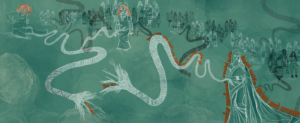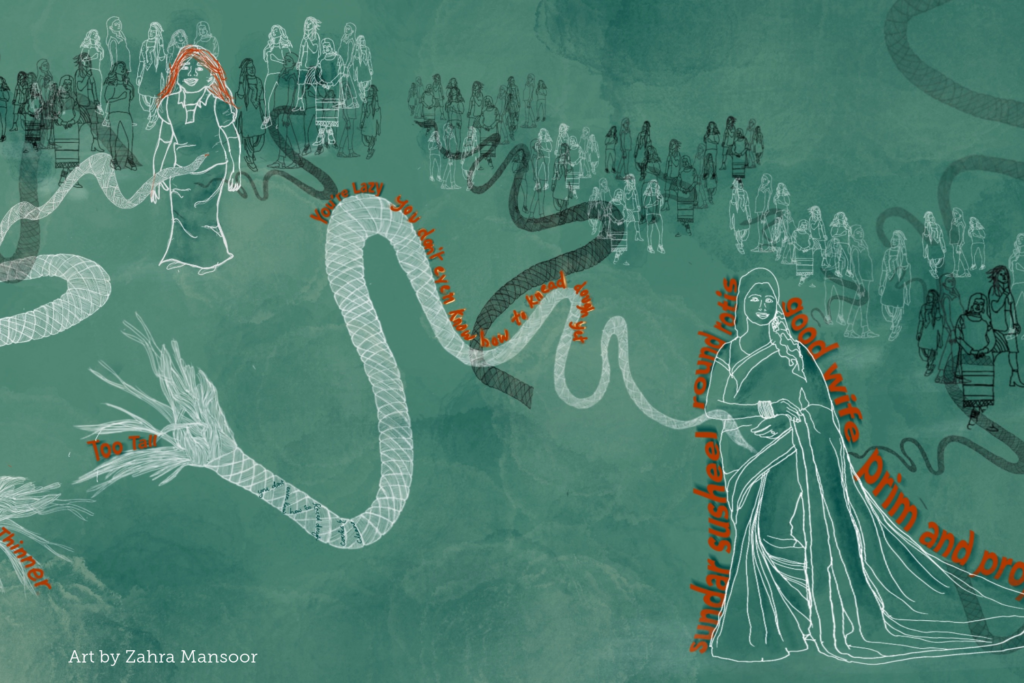Collective piece by Bhoomika Ghaghada, Zahra Mansoor, and Juneida Abdul Jabber.
I want to be happy for you.
“Guess what??” Seema texted me.
I picked my phone up from my car’s cup holder, careful not to burn myself on the steel rim. I had just settled into the driver’s seat, during the peak of a Dubai summer. Putting my seatbelt on carefully with one hand and typing with the other: “What?”
She insisted I guess.
I hate it when she does this. Nothing good ever followed suspense my entire life.
After some needling, she finally told me her movie review was published in a magazine we both loved. There was a link. It was about the male gaze in a movie we had watched together a few days ago. As I scrolled on the phone, forgetting to turn the A/C on, sweat rolled off my back. The analysis, the words, the tone; they sounded so familiar. I was breathing heavier, trying to recall: Had she said this or had I?
“Wow,” I typed, shaking.
I was indignant. This wasn’t jealousy. My skin emitted a blaze that could char every tree on the block, every car in the vicinity. Blue, orange, and white. I can’t believe her. She wouldn’t have even watched this film if I hadn’t insisted on it!
And then, in a fever pitch came the thought: Networking can get you anywhere, huh?
Fumes. I put the phone down and took a few deep breaths. I remember that movie night: I got salt and caramel popcorn, and she got only salt- the right ratio to share. It was the Friday following an arduous week. Walking to the cinema, I told her how everything I’ve done turns to ashes in a room full of people. She told me how she feels confused about where she’s going, how her accomplishments don’t feel real.
Was she feeling like that about this review? I turned the A/C on and a switch flipped inside me. She had no reason to. I remembered crying after reading the short story she had written about her sister. It was raw. Written with love and grace.
The fire inside me subsided as quickly as it was lit. I picked up my phone to re-read the review. It was sharp, witty, funny. Classic Seema.
I shifted in my seat as I began to drive, wondering at the intensity of what had come over me. I have felt this before. What was it? Anger? Entitlement? Because I watched a movie?
I looked down to see a taut rope extending from my navel. Was this always here?
My stomach flooded. This feeling! This one, I knew: Shame.
I’m six. From the backseat of my father’s car, my knees wedged between the two front seats, I was leaning forward, so I wouldn’t miss a word my parents said:
Your cousin Diya makes lunch for the whole family, and she’s only eight. You don’t even know how to knead dough yet.
I’m eight. Meena just won an award for elocution. She doesn’t laze in front of the TV like some people.
I’m eleven. Gayatri has gotten so skinny. I noticed she only ate one roti at dinner. If you climbed seven flights a day, you won’t have thighs that look like that.
Strand by strand, the rope was plaited. Over decades. Thicker than my thigh. One end attached to my stomach’s shame valve. You’re not good enough. The other, with a hook, to other girls’ accomplishments.
Above a deranged see-saw, love dangled just out of reach, finite and brittle. Up for grabs. The taut rope, the shame, its primary mechanism: Be lively. Be quiet. Be shrewd. Be naive. Be an overachiever. Don’t be an attention-seeker. Be smart. Don’t be opinionated.
Every woman I met, I hooked this rope onto, rode this see-saw with. It was important to keep the seesaw going. Shame was the only fuel I had known. Every cousin’s accomplishment released another wave. Every friend’s Instagram post compelled me to add five new things to my to-do list. Every South Asian woman on Twitter gave me another boost.
The rope tugs. A wave of shame. I go up on the see-saw. Then down. I’m exhausted. Can I get off?
I was now driving down E44. In my mind, I watched Seema on the see-saw floating, the taut rope lifting her up. Aunts, uncles, cousins, and strangers, eager spectators and unfair judges, cheered for her to fall. Alienated. Jealous. Bullied. Unloved, even at the top.
I wanted to scream. I wanted to grab Seema, envelop her and run, but I couldn’t get to her. The rope.
Up and down.
We took turns.
We all fall down.
How many times had I been on top and felt unsafe sharing good news? How many times had Seema dimmed her light around me?
How long had I been on this nauseating ride?
I made a decision, took an exit. The ACE Hardware store sign was visible from kilometres away. I parked in a rush and jogged to the counter. Blinders on.
The woman behind the glass smiled. I panted: “Hi. I’m looking for an um, axe or – a, a knife I can cut this with?” I pointed at the giant rope attached to my navel. She shot me a look of understanding and concern. Then, she led me to an aisle in the far corner.
“Here,” she said.
I grabbed the green cleaver she indicated. “Will this work?” I asked. She shrugged, not entirely certain. I inhaled deep and flung my hand: I sliced the rope from my belly.
Thud. I stared at the stub. The weight of generations on the floor. The cruel voice in my head softer. Maybe, I am enough. I gripped the cleaver tight. The saleswoman smiled.
I beamed at her: “How many do you carry?”
Heart full, lugging a bouquet of cleavers, I texted Seema: “I’m so happy for you. Meet me under your building in ten minutes. I love you.”

Art by Zahra Mansoor


